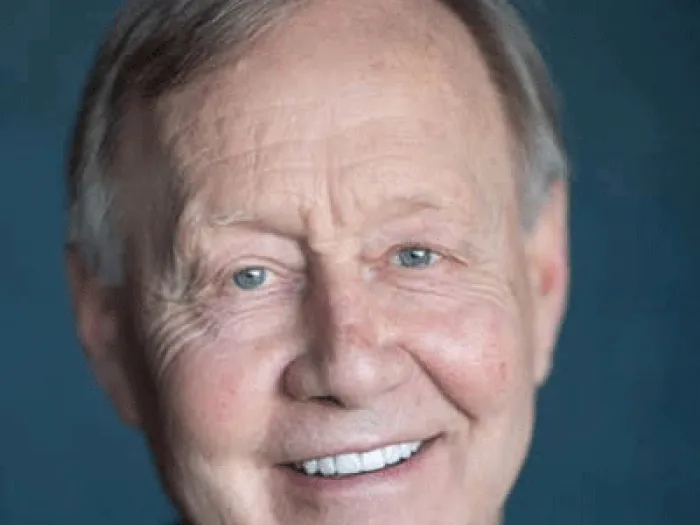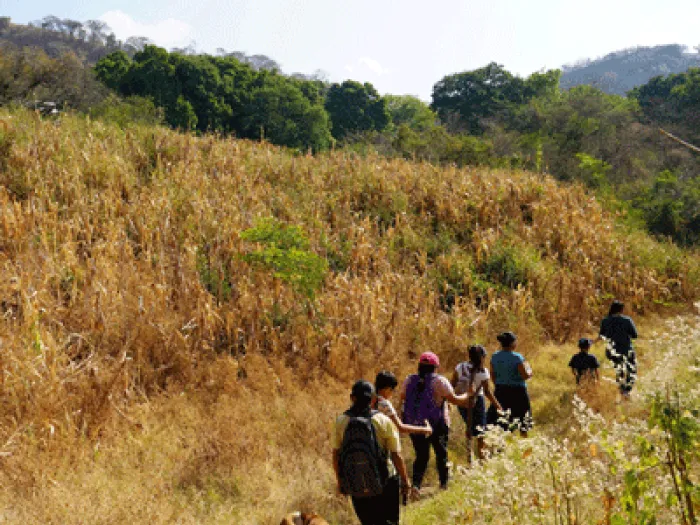The PC(USA)’s Young Adult Volunteers learn from a panel of Louisville leaders
Their next official act was to journey to places around the world helping to build God’s kin-dom

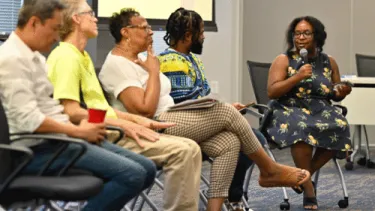
LOUISVILLE — As they neared the end of a time of training and team building at the Presbyterian Center and online on Friday, more than two dozen of the class of 2023-24 Young Adult Volunteers got to hear stories of both inspiration and encouragement from a panel of Louisville-based faith leaders and advocates.
YAV Coordinator Destini Hodges offered up discussion questions to these panelists:
- Lawrence Robertson Jr., the administrator in the office of the director of the Presbyterian Mission Agency’s Compassion, Peace & Justice ministries
- The Rev. Dr. Angela Johnson, the pastor of Grace Hope Presbyterian Church
- Andrew Kang Bartlett, Associate for National Hunger Concerns in the Presbyterian Hunger Program
- The Rev. Samuel Son, the PMA’s Manager for Diversity and Reconciliation
- The Rev. Stachelle Bussey, founder and executive director of The Hope Buss, which serves historically neglected and underserved families in Louisville, primarily in the city’s West End, where 60% of residents live at or below the poverty line.
Hodges asked: What do poverty and race look like to you?
Son called on the church “to do deep theological archeology on what it teaches and how it still justifies racism … Segregation at churches is not by default.”
Kang Bartlett noted “decades of discrimination against African American farmers” and the “exploitation of labor, which continues today.” Many Americans still have the image of “the humble farmer. That’s the reality, but it’s a tiny reality.” Nearly 2 million Americans are farmers, but “we have more people in prison than that.”
Johnson said Grace Hope Presbyterian Church is seeing “a lot of people 60 and over at our monthly food program.” The church is in one of the nation’s poorest ZIP codes, 40203. “We understand that racism is involved in all the systems of helping people,” Johnson said. She and others at Grace Hope are involved in CLOUT, Citizens of Louisville Organized and United Together and Direct Action and Research Training in order to “do the work of justice in boardrooms and courtrooms, and not just benevolence,” Johnson said. “The work of justice has become even more intense.”
Johnson is also a member of the city’s Community Safety and Equity Committee, which was created after the U.S. Department of Justice announced this spring that the Louisville Metro Police Department and Louisville/Jefferson County Metro Government had engaged “in a pattern or practice of conduct that violates the U.S. Constitution and federal law” following the March 13, 2020 killing by police of Breonna Taylor, DOJ officials said. “Justice ministry is not for everybody,” Johnson told YAVs. “Some have a heart for justice in this arena, and others for justice on the street. We try to work at both ends of the spectrum.”
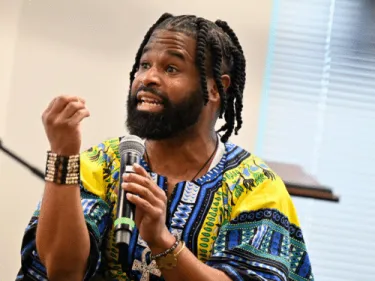
Lawrence sees racism in the arts as well, relating the story of not being cast as Jesus in a school production of “Jesus Christ, Superstar” after a teacher told Lawrence, “We can’t have a Black Jesus.”
“We have Black and minority-owned theatrical companies who can’t get funding,” Lawrence said, even though “Louisville is a beacon for great artists, and a lot of them have darker pigmentation.”
When Hodges asked panelists how they’ve used their privilege doing ministry, Bussey said she founded The Hope Buss as field education during seminary, saying she wanted “to look at faith work from a different lens than the church.”
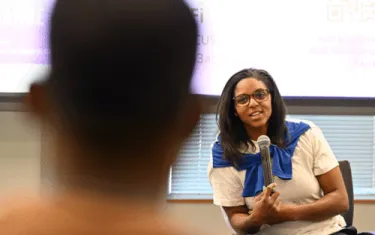
“When the protests over Breonna Taylor hit, I was working at a multicultural church, and they said they didn’t know if my views aligned with theirs,” she said. “We were taking people to the grocery store.”
Son said one’s identity “can bring privilege or it can put you in a vulnerable position. In the Korean church, my maleness gave me privilege.”

When you have privilege, “you have to really listen well,” Son said, quoting Prof. Noam Chomsky: The work is “not to speak the truth to the oppressed, but to learn from the oppressed.” Son serves part-time at Shawnee Presbyterian Church in Louisville, an African American faith community. “I preach,” he said, “but really, they preach to me.”
He also writes and performs slam poetry, demonstrating one of his creations at the end of Friday’s session. “You want to hear the prophets in your community?” he asked the YAVs. Consider attending a poetry slam. “There is truth being spoken there by people who are usually silent. You don’t have to be a published poet — just tell us what your experience is … I try to be a better ally by listening to the truth from people, especially those who are marginalized.”
The racial reckoning that began in 2020 following the murder of George Floyd “was old news to people of color but new to a lot of white people,” Kang Bartlett said. The average lifespan for a person living in Louisville’s West End is about a decade less than Louisville’s majority white neighborhoods. “How do we take this new awakening and make real changes for the long term?” Kang Bartlett asked. “You have a lot of momentum and systems working against it.”
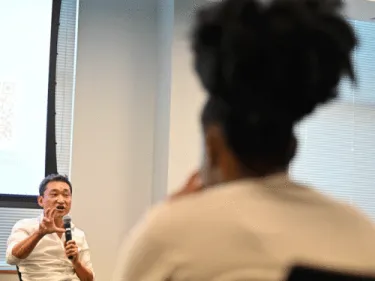
“You are still my America,” Son said during his spoken word performance, which earned him finger snaps from the crowd. “You think you’re great, as all drunks do, but you, you old drunk fool, are still my America … I believe in you, my America, because you are a dreamer. Your fathers and your mothers came through these same shores.” The dream that the Rev. Dr. Martin Luther King Jr. talked about during his famous March on Washington address “is as old as the Tigris and Euphrates. It was a dream Abram had, that Isaac and Ishmael would lay down their swords.”
You may freely reuse and distribute this article in its entirety for non-commercial purposes in any medium. Please include author attribution, photography credits, and a link to the original article. This work is licensed under a Creative Commons Attribution-NonCommercial-NoDeratives 4.0 International License.


